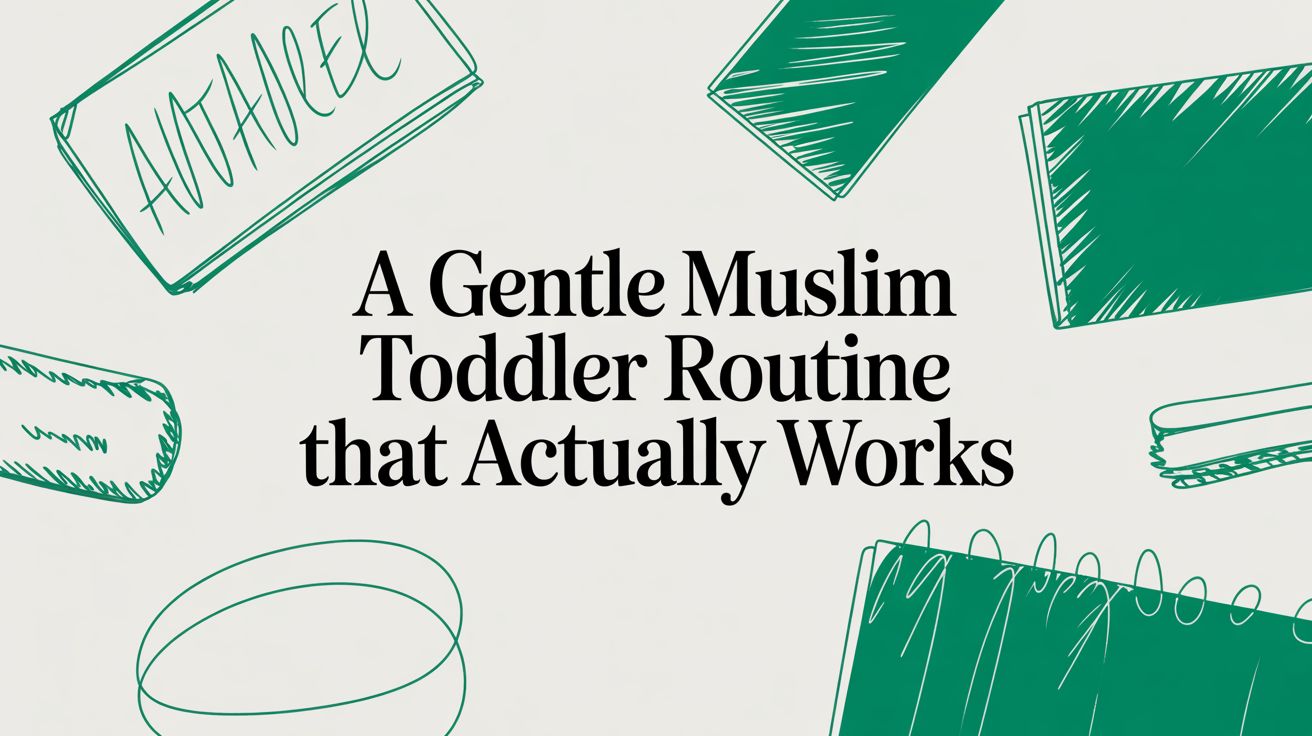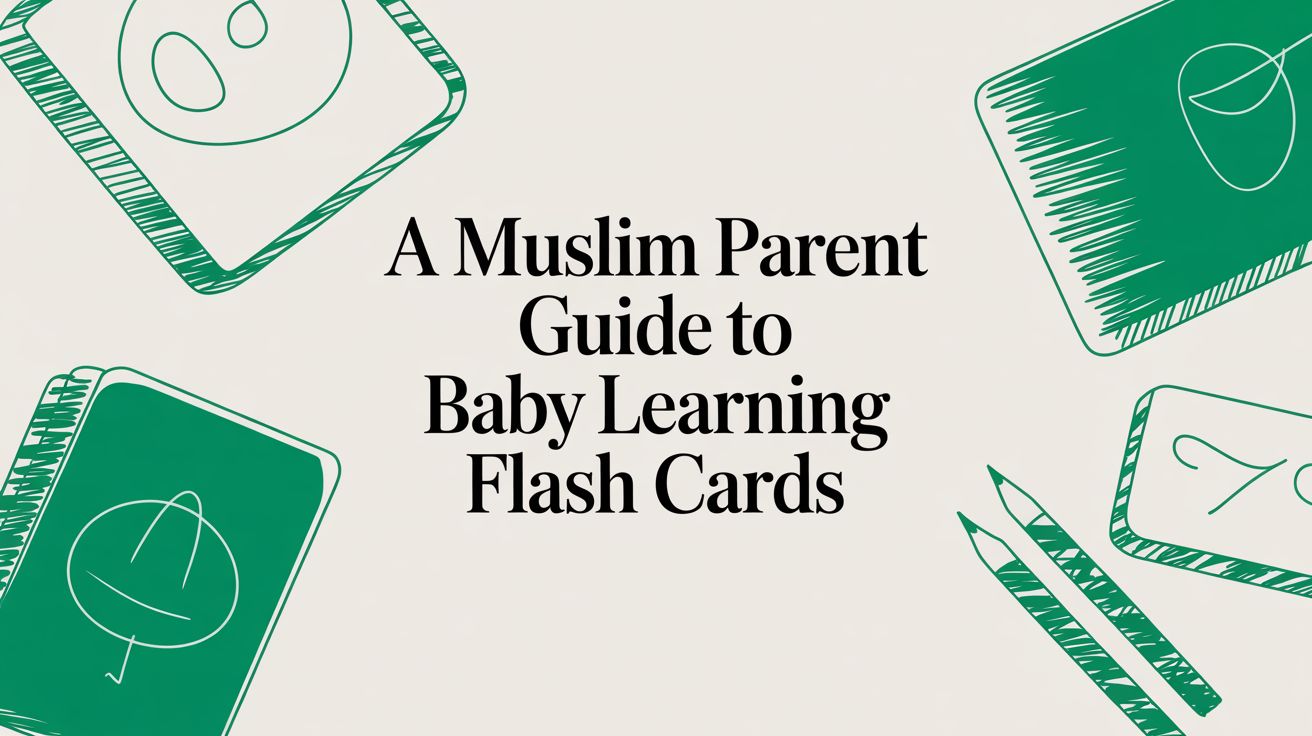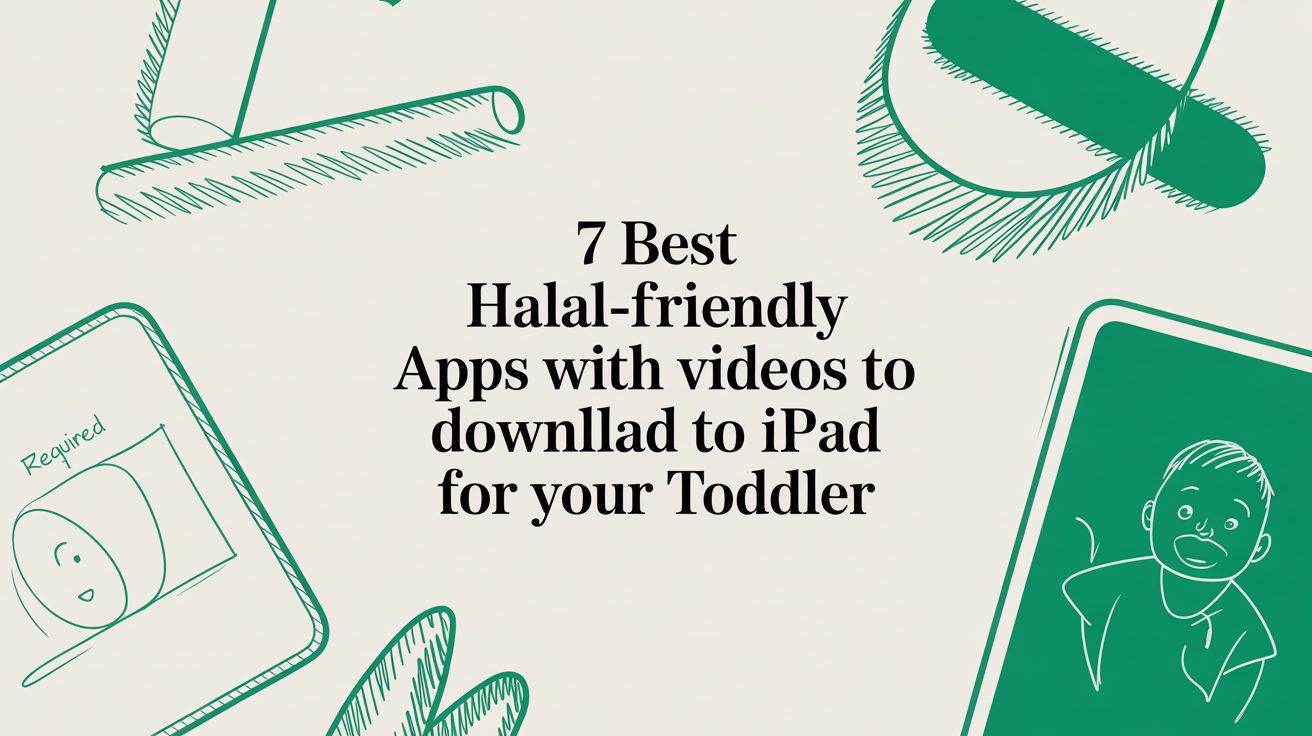A gentle routine for your Muslim toddler isn't about a rigid, minute-by-minute schedule. It’s about creating a predictable, faith-centered rhythm for the day. Think of it as a series of anchors—waking up, meals, play, and bedtime—that give your little one a sense of security and make it easy to naturally weave in Islamic values and simple duas. This flexible routine supports busy days—whether you're working from home, rushing to nursery drop-offs, or preparing for Eid festivities—while centering your toddler in faith and calm.
Why a Gentle Rhythm Matters for Your Family
Let's be real: life with a toddler is beautifully chaotic. Trying to stick to a strict schedule often just adds more stress to the mix. A gentle, flexible routine—or a rhythm, as I like to call it—is different. It becomes the heartbeat of your home, creating a predictable flow that helps your child feel safe and grounded.
This isn't about control; it's about connection. For Muslim parents, this rhythm provides the perfect framework for nurturing your child's development while seamlessly weaving in the beauty of our faith. It's designed to work with the realities of our lives, like timing naps around Salah or getting dinner ready before Maghrib. Instead of adding pressure, a good rhythm actually reduces the daily friction and opens up those precious, organic moments for teaching and bonding.
The Benefits of a Predictable Day
When toddlers know what to expect, they feel more confident and are often more cooperative. This sense of predictability can lead to some wonderful changes in the home.
- Fewer Tantrums: So many meltdowns happen because a child is overtired or overstimulated. A consistent rhythm helps you stay ahead of their needs and manage their energy levels.
- Smoother Transitions: Moving from playtime to lunch or from a trip to the park to naptime becomes much less of a battle when it’s a familiar part of the day.
- Less Nursery Drop-Off Tears: Predictable mornings help ease your child's anxiety when you leave them at daycare or nursery.
- Deeper Family Bonds: Those small, shared rituals—like saying Bismillah before a snack or snuggling with a book before bed—become cherished moments of connection that you'll all remember.
- Natural Faith Integration: The routine itself becomes the canvas. It creates natural openings to introduce simple duas, talk about Allah’s beautiful creation on a walk, and model Islamic manners without it feeling forced.
The need for this kind of culturally-aware parenting support is only growing. In the United States alone, the Muslim toddler population is projected to more than triple by 2030. This highlights just how important it is to establish family routines that honor both our children's developmental needs and our faith. For a deeper look at these demographic shifts, check out the projections from the Pew Research Center.
A thoughtful routine is one of the most loving gifts you can give your child. It creates a peaceful, stable foundation for them to thrive, inshaAllah.
The Five Anchors of a Faith-Centered Day
Forget trying to follow a strict, minute-by-minute schedule. For our little ones, a routine feels best when it’s built around a few predictable, gentle moments that ground their day. I like to think of these as our five daily anchors—consistent touchpoints that create a sense of security and open up natural opportunities to connect with our faith.
The goal isn't perfection. It's about weaving simple, loving rituals into the natural flow of your day. This way, we build a positive association with our deen from the very beginning, making it a source of comfort and joy, not a set of rigid rules. This infographic sums up the heart of this gentle, faith-centered rhythm.
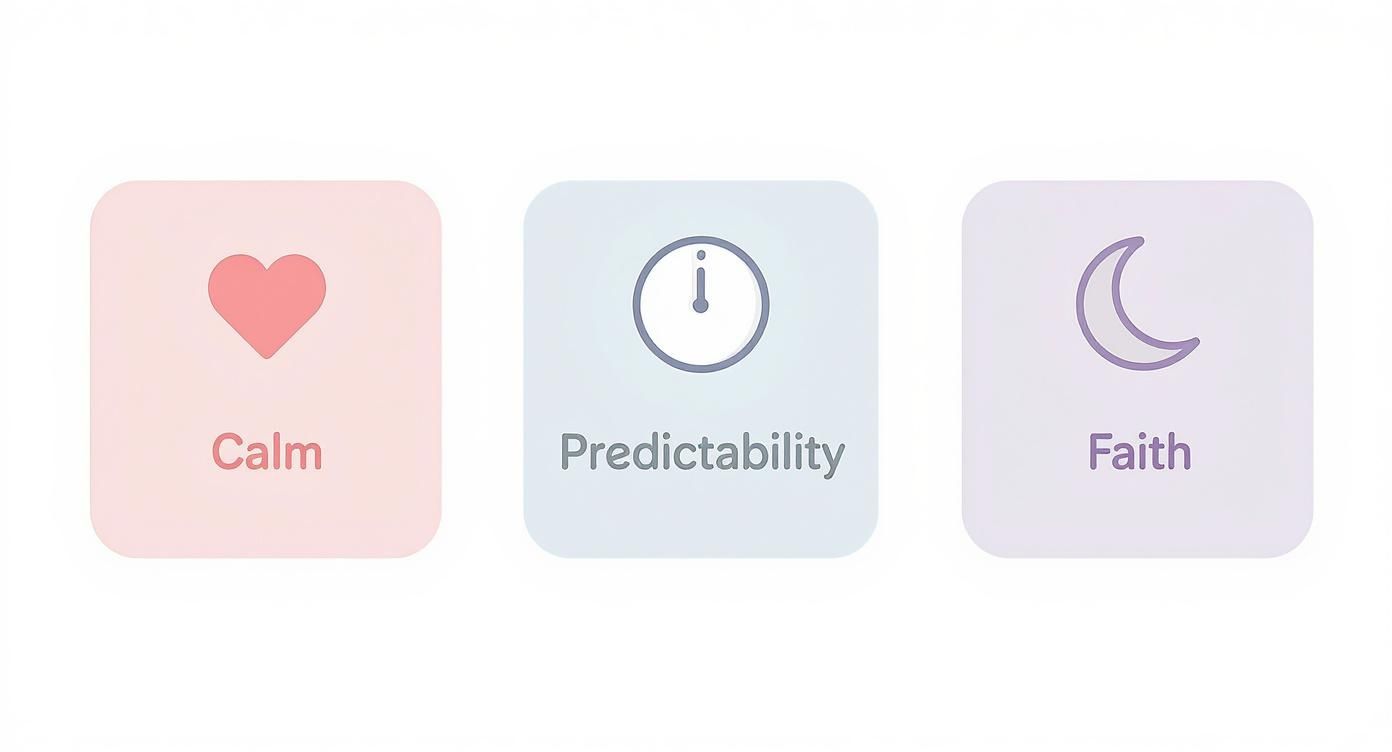
As you can see, a successful routine for a young Muslim child really comes down to a beautiful balance of Calm, Predictability, and Faith. It’s all about creating that nurturing space where they feel secure and deeply loved.
Anchor 1: Waking Up with Gratitude
How the day begins often sets the tone for everything that follows. Instead of immediately rushing into the morning chaos, this first anchor is all about starting with a quiet moment of thankfulness.
When your toddler wakes up, greet them with a warm smile and a gentle, "Alhamdulillah." They might not be able to say it back yet, but they will absolutely absorb the peaceful energy. You can point out the window and say, "Look, Allah gave us a brand new day!" This small act connects waking up with a beautiful expression of gratitude.
Anchor 2: Nourishing with Bismillah
Mealtimes with a toddler can feel a little wild, but they're also a powerful opportunity for connection and mindfulness. This anchor helps us bring intention to the simple act of eating.
- Before the First Bite: Simply saying "Bismillah" together teaches them that we begin everything in Allah's name. It won't be long before they start mimicking you.
- During the Meal: If you can, try to sit with them for just five minutes without distractions. You can talk about the colourful food Allah has provided for us.
- After They're Done: A quick "Alhamdulillah" when they are finished closes that loop of gratitude beautifully.
Anchor 3: Purposeful Play
For a toddler, play is serious business—it’s how they learn about the world. This anchor is about framing their playtime as a way to explore and appreciate Allah’s amazing creation.
This could be as simple as a nature walk where you point out the trees and birds, saying "SubhanAllah." Or maybe it's stacking blocks while talking about building a strong house, or just playing with animal toys and making their sounds. If you attend a local playgroup or library storytime, these same anchors help your child feel secure in new environments. The real goal is to be present and connect their world back to the Creator in simple, joyful ways.
Anchor 4: Quiet Time and Naps
In the middle of a busy day, a pause is absolutely essential for a toddler's developing brain. This anchor is all about creating a predictable, peaceful wind-down before a nap or a designated quiet time.
It doesn’t have to be complicated. You could dim the lights, snuggle up on the sofa with an Islamic storybook, or listen to a gentle, instrument-free nasheed. For parents working remotely, this predictable rest time can open a window to pray Dhuhr on time or join a quick virtual support group while your toddler rests. Creating this calm transition helps them relax and truly recharge.
Anchor 5: Calm Bedtime Wind-Down
The end of the day is such a sacred time for connection and comfort. This final anchor solidifies that feeling of safety and love right before they drift off to sleep.
A consistent bedtime ritual is one of the most powerful tools for a peaceful night. It signals to your child’s body and mind that it's time to rest.
Your routine might include a warm bath, changing into cosy pyjamas, and reading a favourite book together. Try ending the day by reciting the Shahada or a simple bedtime dua. For some lovely ideas, you can check out our guide on the beautiful dua, "Allahumma inni as'aluka", and how to introduce it. Whispering "I love you for the sake of Allah" as you tuck them in creates a beautiful, lasting memory they’ll carry with them.
Weaving Islam into Everyday Moments
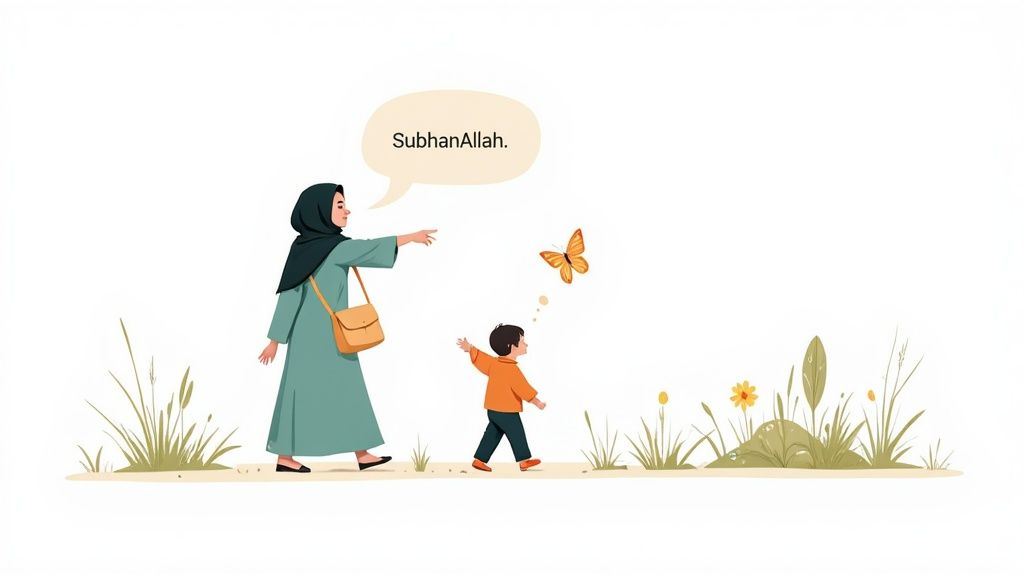
You don't need formal lessons or long lectures to introduce Islam to your toddler. The most beautiful way to build their connection with Allah is by weaving faith into the little, everyday moments you already share. It’s about turning your muslim toddler routine into a gentle, organic learning adventure.
Think of it this way: playing soft, instrument-free nasheeds in the background during playtime or car rides on the school run isn't just noise—it's creating a peaceful atmosphere. This helps your little one instinctively link calm, happy feelings with the sounds of their faith.
Even the words you use matter. Saying “SubhanAllah” when you see a beautiful flower on your walk or “JazakAllah Khair” when your toddler hands you a toy are powerful, real-time lessons in gratitude and awareness.
Before we get into the details, here are five simple, stress-free ways to get started:
- Play gentle, instrument-free nasheeds softly during playtime or car rides.
- Model simple tasbeeh phrases, like "Alhamdulillah," when you're enjoying a snack together.
- Snuggle up with colorful Islamic board books during storytime.
- Practice sharing toys and saying thank you with Islamic phrases.
- Let your toddler help you drop a coin into a family sadaqah (charity) box.
Using Nasheeds to Set a Calm Tone
A short, soothing nasheed can completely change the vibe of a playroom. I’ve found that picking a nasheed with a gentle voice and no instruments works wonders. Just 5–10 minutes is all it takes to help a busy toddler settle into an activity without feeling overstimulated.
Platforms like Babymode have curated playlists of ad-free nasheeds that are perfect for this. Try queuing up a 7-minute track while you're getting out the building blocks and see how it helps your child focus.
Soft nasheeds in playtime help create a calm state that supports learning and emotional regulation.
Modeling Faith with Your Words
Toddlers are amazing mimics. They learn by watching and listening to you.
When you naturally say “MashaAllah” after they build a tall tower of blocks, you're not just praising them—you're giving them the language to connect their achievements and the beautiful things they see back to Allah. It’s all about making remembrance a reflex.
- Every phrase you model helps grow their vocabulary and spiritual connection.
- Keeping the phrases short and simple makes them easy for little minds to grasp.
Don't be surprised when, after a few weeks, you hear your toddler whisper “Alhamdulillah” after finishing their milk or a quiet “Astaghfirullah” after a little stumble. These are huge wins!
Making Storytime an Islamic Experience
Bedtime or a quiet afternoon is the perfect chance for a faith-filled story.
Find board books with bright, engaging pictures about the prophets, animals mentioned in the Quran, or daily duas. Cuddle up close, point to the pictures, and let your toddler help turn the pages. You’re building positive memories around Islamic learning.
For a little extra benefit, you can mix in simple Arabic words with English. This is a fantastic way to support their language development and strengthen their Muslim identity from day one.
Simple Actions Speak Volumes
It’s the small, consistent acts that truly build a foundation of faith.
- Make giving sadaqah a physical act. Let them be the one to put the coin in the box.
- When they share, praise them and say “BarakAllahu Fik” (May Allah bless you).
- As you wash hands before a meal, say the dua for eating together.
And when it comes to screen time, you can make that a positive experience, too. For some great, faith-aligned options, check out our guide to https://babymode.ai/blog/islamic-cartoons-for-toddlers.
By threading these tiny moments of sound, speech, stories, and good deeds throughout your day, faith becomes a natural, beautiful part of life’s tapestry—not a separate subject to be taught.
Remember to celebrate every small step. You're doing an amazing job.
Navigating Common Toddler Challenges with Intention
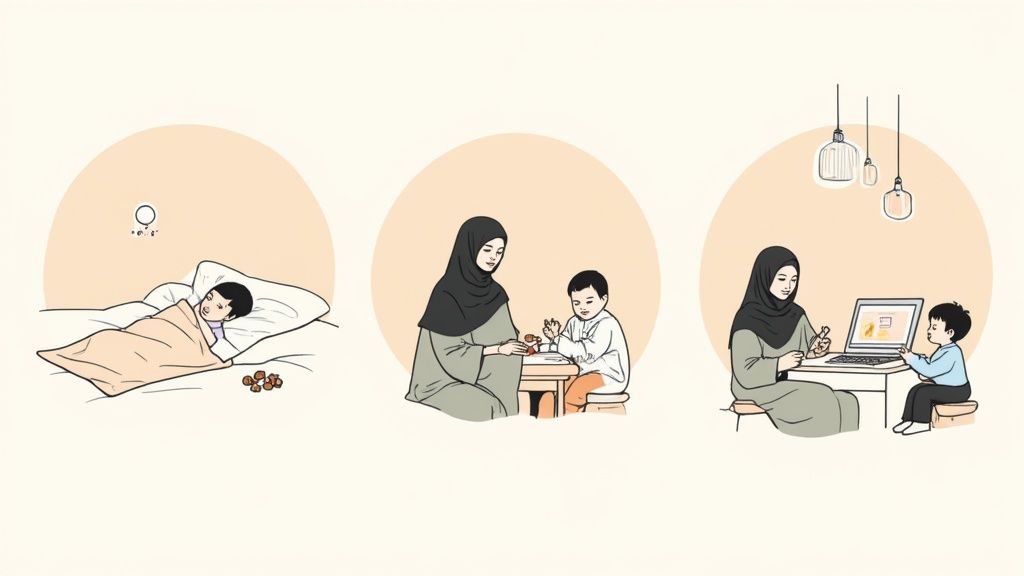
Let's be honest—toddlerhood is filled with tests of our sabr (patience). Naps, meals, and screen time can feel like daily battles. But when we approach these challenges with intention, they transform into beautiful opportunities to connect with our little ones and nurture their fitra.
It’s about weaving simple duas, consistent rhythms, and halal-aligned choices into these everyday moments. For instance, creating a cozy nap corner with soft blankets and whispering a dua before they drift off doesn't just help them sleep; it builds a profound sense of security and trust in their world.
The Gentle Art of Toddler Naps
Getting a toddler to nap can feel like a monumental task, but a gentle, consistent routine is your best friend. I've found that anchoring naptime to a prayer, like right after Dhuhr, helps create a predictable flow for the day that honors both rest and faith—and even fits around a quick Zoom call for parents working from home.
It won't happen overnight. It takes time and repetition for a toddler to connect the cues with feeling sleepy. A soft, whispered dua before every single nap is a powerful signal that it's time to rest.
- Create a peaceful space: Think soft blankets, a gentle white noise machine, and a dim night light instead of harsh overheads.
- Use a consistent dua: Whispering something simple like “Allahumma bismika amutu wa ahya” (O Allah, in Your name I die and I live) as you lay them down becomes a comforting, familiar sound.
Taming the Picky Eater
Is there anything that tests a parent's patience more than a toddler refusing food? Instead of getting into a power struggle, try sparking their curiosity by framing meals around Sunnah foods and special treats for occasions like Eid.
Offering finely diced dates (for children over one) or a spoonful of yogurt sweetened with a touch of honey can make new tastes more inviting. We also try to time our main meal before Maghrib, so the whole family can pray together shortly after eating. This small act of alignment reinforces the beautiful way our faith is woven into every part of our lives, including nourishment.
| Sunnah Food | Introduce | Serving Idea |
|---|---|---|
| Dates | After 1 year | Finely chopped or pureed into oatmeal. |
| Honey | After 1 year | A small drizzle mixed into plain yogurt. |
| Barley Pudding | Around 18 months | Serve warm as a comforting, gentle meal. |
Setting Healthy Screen Time Boundaries
Let’s reframe screen time. It doesn't have to be a source of guilt or a sign of failure. Sometimes, you just need a few minutes to pray in peace or get dinner on the stove, and a carefully chosen video can be an incredible ally.
The key is quality over quantity. Opt for high-quality, ad-free platforms designed for little ones, like Babymode. It gives you peace of mind knowing the content is appropriate. I always recommend previewing shows yourself and pairing screen time with a hands-on activity, like having them draw what they see or build with blocks.
If you're curious about navigating mainstream shows, our guide on why Peppa Pig resonates with many Muslim families offers some great insights on language-building and manners: Explore our Peppa Pig guide for Muslim families.
- Start small: A daily limit of 15 minutes per session is more than enough for this age.
- Play first: Always offer hands-on play before suggesting a screen.
- Watch together: When you can, co-watch and talk about what's happening. It turns passive viewing into an active, shared experience.
Remember, allowing some well-chosen screen time can be a healthy way to give yourself breathing room without compromising your connection with your child.
Celebrate the small wins! When a nap goes smoothly or they try a new food without a fuss, a quick "Alhamdulillah" shared with them reinforces that positive moment. Over time, these gentle, thoughtful adjustments will help you find a beautiful balance between your faith and the flexibility that parenting requires. You'll see fewer mealtime battles and feel less screen-time guilt, insha'Allah.
How to Stay Flexible When Life Happens
Let's be real. You can create the most beautiful, thoughtful routine for your little one, and then life happens. A sudden fever, an unexpected visit from family, or just one of those days where nothing seems to go right.
I’ve been there more times than I can count. It’s easy to feel like you’ve failed when the schedule falls apart. But here's something I've learned over the years: the true strength of a good Muslim toddler routine isn't how rigid it is, but how gracefully it can bend.
Think of flexibility as a form of mercy—for your child, and definitely for yourself. When things go off the rails, just remember your niyyah (intention). Allah sees your effort to build a home filled with love and stability, even on the most chaotic days.
When Sickness Strikes
A sick toddler doesn't care about the clock. They need one thing and one thing only: comfort. This is the time to gently set aside the usual rules about independent play or timed naps. The new routine is simply whatever brings them peace.
That might mean more screen time with some soothing nasheeds, lots of extra cuddles on the sofa instead of structured playtime, and offering simple, nourishing foods whenever they show a flicker of interest. Your goal shifts completely. You're no longer a schedule-keeper; you're the chief provider of reassurance and care. This is a time for snuggles, stories, and whispering lots of dua for shifa (healing) over them.
A day spent comforting your sick child is not a wasted day. It's a day deeply rooted in the Islamic values of mercy, compassion, and care.
Adapting for Weekends, Jummah & Eid
Weekends just feel different, don't they? Your routine should reflect that. It’s more than okay—it’s healthy—to have a more relaxed rhythm on Saturdays and Sundays. Naps might happen a little later to fit in a family outing or a visit to the masjid for Jummah.
Speaking of Jummah, the goal is to make it a positive experience, not a source of stress.
- Talk it up: Before you go, talk about the masjid in an excited, happy tone. "We get to go to Allah's house today!"
- Time the nap: If you can, try to schedule their nap either before you leave or plan for a car nap on the way home. A well-rested toddler is a happier mosque-goer.
- Pack a 'masjid-only' bag: Fill a small bag with a special quiet book or a soft toy they only get to play with at the masjid. This novelty can work wonders.
And when Eid arrives, consider a little craft session—like decorating a lantern or making Eid cards—as part of your evening wind-down. It gives your toddler something to look forward to and weaves the special day into your usual pattern of calm and connection.
Managing a Toddler and a New Baby
Bringing a new baby home is one of the most beautiful—and disruptive—things that can happen to a family. Your toddler's entire world has just been turned upside down. The key to helping them through it is to preserve one or two of their most important 'anchor' moments in the day.
Maybe their special time with you is the bedtime story and dua routine. Protect that time with everything you've got. In a sea of change, that small pocket of predictability offers them a huge sense of security.
Another great tip is to involve them as your "special helper" with the baby. Giving them small "jobs" like fetching a diaper, singing a lullaby, or helping with a baby blanket can provide a much-needed sense of purpose. Your grace and patience during this transition will teach them more about love and family than any perfect schedule ever could.
Answering Your Questions About Muslim Toddler Routines
As you start to weave faith and structure into your toddler's day, it's natural for questions to pop up. Let's tackle some of the most common ones I hear from parents who are figuring out what works best for their families.
How Do I Start a Routine If We Have No Structure at All?
If you're starting from scratch, the golden rule is to go slow and prioritize connection over perfection. Forget about implementing a full, minute-by-minute schedule overnight—that’s a recipe for frustration for everyone.
Instead, pick just one "anchor" time in the day to focus on first. Bedtime is a great choice. For the first week, your only goal is a simple, 15-minute wind-down. Maybe it's a warm bath, slipping into PJs, cuddling up with an Islamic storybook, and whispering a short dua in their ear. That's it.
Once that one anchor feels easy and calm, add another. It could be as simple as a consistent morning wake-up with "Alhamdulillah" and a shared breakfast. You'll build your muslim toddler routine piece by piece, at a pace that feels genuinely good for your child and you.
What Are Some Good Ad-Free Islamic Shows?
This is a huge one. Finding safe, halal screen time is a major concern for so many of us. You want to protect their little eyes and hearts from ads and content that just doesn't align with our values. The best bet is to look for platforms created specifically for Muslim kids.
Many parents have found peace of mind with options like Ali and Sumaya, Durtoons, and some of the curated ad-free playlists on channels like Omar & Hana. A good rule of thumb is to always preview the content yourself first. Even better, when you can, sit down and watch with them. It transforms passive screen time into an active, shared moment.
Choosing ad-free media isn’t just about avoiding commercials; it’s about creating a safe digital environment where your child’s innocence is protected.
How Do I Handle Routine Differences with Grandparents?
Oh, this is such a common and delicate situation. The most effective approach is rooted in gentle, respectful communication. Try to calmly explain your ‘why’—that a predictable rhythm helps your toddler feel secure, which in turn helps them manage their big feelings. It helps to frame it around what works best for your child's specific needs and temperament, rather than making it about right vs. wrong.
A little flexibility goes a long way, too. The 80/20 rule can be a real sanity-saver here. Aim for consistency 80% of the time with your core routine, but allow for that 20% of flexibility, especially when you're with family. A later bedtime at grandma's house won't undo all your hard work.
How Should Our Toddler's Routine Change During Ramadan?
Ramadan brings a beautiful, different energy to the whole house. For a toddler who isn't fasting, the main goal is to keep their core meal and sleep times as stable as possible. This helps prevent them from getting overtired and overwhelmed by the change in the household's schedule.
Your family will find its own unique flow. Maybe your little one eats their dinner at their usual time and then joins the family for a few dates and a special smoothie at Iftar. Naps might need to be shifted a bit if the evenings are more lively. Most importantly, bring them into the feeling of Ramadan with stories about the Qur'an, simple crafts, and the warm buzz of community.
At Babymode, we're creating a safe, ad-free screen time solution filled with gentle nasheeds, Quranic stories, and positive Islamic values, all reviewed to be perfect for your 0–3 year old. Join the waitlist to be the first to know when we launch.
